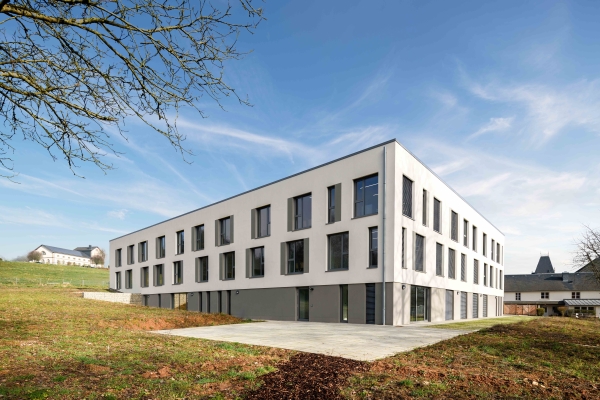 Credit: CHNP
Credit: CHNP
On Monday 4 July 2022, Luxembourg's Minister for Family Affairs and Integration, Corinne Cahen, the mayor of Useldange, Pollo Bodem, the chairman of the board of directors of the Neuro-Psychiatric Hospital Centre (Centre hospitalier neuro-psychiatrique - CHNP), Dr Michel Nathan, and the director of the "De Park" entity, Carmen Recken, officially inaugurated the new “Foyer Atert” accommodation structure in Useldange.
With a maximum capacity of 34 beds, the Foyer Atert offers a place of residence and life adapted to the accommodation of adults with a chronic inttelectual disability and in need of specific supervision in their daily life.
Ms Recken said: "Our main objective is to support people with intellectual and / or psychological disabilities on the path to autonomy, so that they have the chance to set up their own life projects and find their place in society.”
At the Foyer Atert, residents will benefit from 24/7 support from a multidisciplinary team. In addition, they will have the opportunity to take part in numerous activities offered, among others, at the Day Centre. These interactive and practical activities are regularly evaluated and adapted to the needs of the residents.
During her speech, Minister Cahen, first of all thanked the CHNP and in particular its "De Park" entity for the good cooperation over the past few years. She placed particular emphasis on the need for this new offer.
“The creation of the Foyer Atert meets a real need,” said Minister Cahen. "The new Useldange home shows once again that the CHNP and more particularly 'De Park' is open-minded when it comes to trying new models of support that are more adapted to the needs specific to the target population".
Indeed, when an intellectual illness becomes chronic, the people concerned are limited in their participation in social life and the evolution of the illness results in the progressive installation of a handicap. These people, for whom treatment has no therapeutic aim, no longer really have a place in a hospital. The new structure in Useldange thus makes it possible to offer services better suited to the specific needs of these people.
Built on three floors, the new building offers a floor area of 1,700 m2 with 34 individual rooms. The budget invested amounts to €8.2 million.
The De Park entity (www.depark.lu)
De Park is a care and socio-pedagogical support centre for people with intellectual or psychological disabilities. This centre offers extensive therapeutic courses, including in particular social, artistic and musical therapy or even psychomotricity.
At the Park, the supervision is specifically adapted to the needs of the residents. Participants in daytime activities are supervised in different groups whose activities are adapted to the specific needs of different degrees of disability. The teams are able to react professionally and quickly to any situation of supervision and socio-pedagogical and therapeutic accompaniment of a person with an intellectual or psychic handicap, with or without adaptation problem, while taking into account the needs specific to their degree of disability.
In Ettelbruck, De Park has five spacious accommodation structures and two day centres spread across the park of the CHNP. In Useldange, De Park manages the Foyer Atert which takes care of people with an intellectual disability. On both sites, De Park is first and foremost a living space whose primary objective is the development and well-being of its residents. Another goal is to enable each resident to acquire maximum autonomy by actively integrating them into a social structure based on respect and tolerance.
The CHNP
With more than 165 years of experience, the CHNP specialises in the treatment of mental illnesses. In order to offer an optimal quality of life to its patients and residents, the CHNP aims in its mission to rehabilitate each person and as far as possible, reintegrate them into society. The CHNP is structured in three entities, each one being specially dedicated to a type of population:
- The Rehaklinik for clinical activities of psychiatric rehabilitation;
- Le Pontalize for care and support activities for the elderly;
- De Park for care and socio-pedagogical support activities for people with disabilities.
In a permanent concern for quality, the CHNP places the patient and resident at the centre of its concerns and defends the principle of equality in difference.








